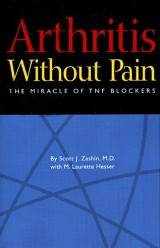Arthritis Without Pain: The Miracle of TNF Blockers
by Scott J. Zashin, M.D. with M. Laurette Hesser
Rev. ed. Sarah Allison Publishing Company, 2004. Softcover, xiv + 261 pp. ISBN 0-9754060-0-0
 Of the new TNF-alpha antagonists -- principally etanercept (Enbrel), infliximab (Remicade) and adalimumab (Humira) -- that have generated so much attention in recent years and that have promised a revolution in the treatment of arthritic conditions, three things can be said. One, they're extremely expensive, costing thousands if not tens of thousands of dollars a year to administer. Two, they've been the subject of an intense marketing and media campaign on their behalf by the pharmaceutical companies, by doctors, and by advocates, who want as many people taking these new treatments and as many prescription drug plans covering them as possible. And three, from all accounts, they really do work.
Of the new TNF-alpha antagonists -- principally etanercept (Enbrel), infliximab (Remicade) and adalimumab (Humira) -- that have generated so much attention in recent years and that have promised a revolution in the treatment of arthritic conditions, three things can be said. One, they're extremely expensive, costing thousands if not tens of thousands of dollars a year to administer. Two, they've been the subject of an intense marketing and media campaign on their behalf by the pharmaceutical companies, by doctors, and by advocates, who want as many people taking these new treatments and as many prescription drug plans covering them as possible. And three, from all accounts, they really do work.
The cost makes me blench, and the marketing makes me nervous. But there's a rationale behind both, and that is that these treatments are unlike anything else that we've taken before. They are far more complex to manufacture than traditional drugs, and they cannot be taken orally -- the digestive system would destroy the proteins before they hit the bloodstream -- and so must be administered by infusion or injection. They are, in other words, qualitatively different from any other arthritis treatment out there, and considerable explanation is therefore required.
There is therefore ample justification for a book such as Arthritis Without Pain: The Miracle of TNF Blockers, written by rheumatologist Scott J. Zashin with M. Laurette Hesser. While it suffers from the breathless "miracle-cure" rhetoric that I've seen before and that sets off my internal alarms, it does a respectable job of explaining what these treatments are, how they work, and how they fit in with other arthritis treatments out there. The detail is considerable, from how these treatments are administered, to how long they may take to take effect. And, to be sure, their potential side effects and drawbacks are mentioned as well.
Arthritis Without Pain was first published in 2000; this is the revised 2004 edition. But events have already overtaken things somewhat: Enbrel and Humira have since been approved for ankylosing spondylitis, for example. And it's primarily a book for people with rheumatoid arthritis; those of us with other rheumatic conditions for which these treatments are (now) indicated may be a little disappointed with that focus.
Another shortcoming too obvious to me as a copyeditor, but that most of you couldn't care less about: the book could frankly have been better written and better proofread. (Page 6: "More than 23 million Americans have [osteoarthritis]. Over one-third are women." Why that's more significant than the nearly two-thirds that are, presumably, men I have no idea.)
And is it truly necessary to use the ® symbol in every instance of a trade name? Style guides would not indicate so. But the fact that Zashin and Hessler cannot talk about Enbrel and Remicade, but only Enbrel® and Remicade®, may have something to do with the fact that Zashin has worked as a paid consultant for the companies involved. I would be more comfortable with reports about TNF antagonists that came from sources not so closely affiliated with the companies who made them.
Labels: book review, books, drugs, enbrel, humira, remicade, tnf
